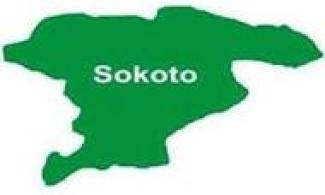
"Bandits are migrating, they found new heaven in Sokoto. The bandits are now regrouping with venom to Silame, Binji, Gudu, Tangaza, Gwadabawa, Illela and Gada local government areas of Sokoto. They are trooping in in hundreds," a resident, Aminu Gandhi disclosed this on Thursday.
Some residents of Silame, Binji, Gudu, Tangaza, Gwadabawa, Illela and Gada local government areas of Sokoto State have raised the alarm over the recent assembly of terrorist groups on major highways in the state and its implications on their farming activities.
"Bandits are migrating, they found new heaven in Sokoto. The bandits are now regrouping with venom to Silame, Binji, Gudu, Tangaza, Gwadabawa, Illela and Gada local government areas of Sokoto. They are trooping in in hundreds," a resident, Aminu Gandhi disclosed this on Thursday.
Usman Mustapha, a farmer, told SaharaReporters that the terrorists have occupied major roads and highways that lead to farmlands in his community, Kyadawa town in the Gada local government area of the state.
"On Saturday, we saw a very large group of young boys, armed with guns, with motorcycles moving to bush areas. People said they migrated to this place from a neighbouring state.
"They have, therefore, warned us not to visit our farms since that day because of possible attacks," Mustapha said.
A resident of Tatarkoi community in the Kada local government area of the state, who simply identified himself as Salihu, said his brother narrowly escaped from terrorists on Monday while working on his farmland.
"Since that day, our father said we should abandon the farm. And this is our only source of livelihood. We have spent close to four days without visiting there. Nobody knows what would have happened to our crops.
"This year, our family had invested more N5m on farming but if this situation does not change soon, we may lose this investment because nobody is ready to face the terrorists. Everybody knows what they are capable of doing.
"Many of our neighbours were once victims of terrorist attacks and kidnappings," he added.
In July, no fewer than 20 people were reportedly killed following a terrorist attack on Duma village in the Tureta Local Government Area of Sokoto State.
One of the residents revealed that the terrorists attacked the village as early as 8:00 am on Wednesday and stayed till 7:00 pm, terrorising locals and rustling livestock.
The resident further said the said terrorists turned out in large numbers, using motorcycles and carrying sophisticated weapons, which they used to kill some of their victims.
He, however, confirmed that over 20 of the victims lost their lives attempting to escape the attack by diving into the river. He said most of them died due to their inability to swim.
Other villagers who spoke on the attack said large herds of cattle were rustled and some community members were forced to lead the livestock out of the town.
Banditry is one of the major forms of insecurity that has affected the North-West Nigeria geopolitical zone for the past decade. Banditry has affected all facets of human life among which is food security in the states affected including Sokoto State.
Reports have shown that banditry has negatively affected food security in Nigeria. These negative impacts include killing and kidnapping of farmers, chasing of farmers out of their farmlands, seizing of farmlands, theft of cattle, burning and raiding of grain silos, and blocking of local trade routes which have negatively affected food security and kikes in price of food items in recent times.
According to the International Organisation for Migration (IOM), Sabon Birni — one of the worst-hit LGAs in Sokoto — recorded an estimated 10,086 displaced persons, primarily farmers.
IOM said the total number of displaced persons in Sokoto rose to 56,593 in September — a 34 percent increase when compared to 42,241 recorded in February. The growth was attributed to the surge in attacks and other security issues bedevilling the state.
According to the international agency, between 2011 and 2020, violence in the North-West region claimed over 8,000 people and displaced over 200,000 others. The situation has since degenerated and given rise to an alarming humanitarian crisis.
Interestingly, the Famine Early Warning System Network (FEWS NET), in a recent crisis signalling report, cautioned that food shortages in Nigeria could worsen the economic conditions in conflict-affected areas of the North-West and North-East.
The organisation noted that, in addition to flooding, the worsening level of conflicts, especially armed banditry and kidnapping, is the primary cause of the recent wave of evictions and disruptions to household participation in livelihood activities, warning that the worst harvest outcomes may be experienced in the affected areas.